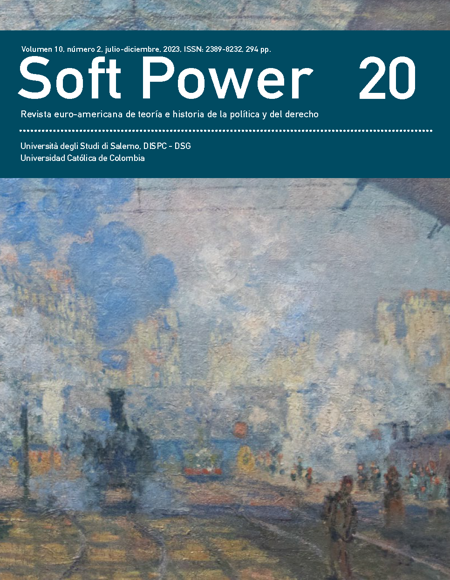
Esta obra está bajo una licencia internacional Creative Commons Atribución-NoComercial 4.0.
Al enviar los artículos para su evaluación, los autores aceptan que transfieren los derechos de publicación a Soft Power. Revista Soft Power para su publicación en cualquier medio. Con el fin de aumentar su visibilidad, los documentos se envían a bases de datos y sistemas de indización, así mismo pueden ser consultados en la página web de la Revista.Resumen
La ciudad contemporánea, como sostiene David Harvey, es el lugar privilegiado que
permite la realización de la plusvalía a través de procesos continuos de reorganización
del espacio urbano. Las metrópolis desempeñan un papel clave como nodos de las cadenas
de valor mundiales y este aspecto pone de relieve la función que desempeñó la
ciudad medieval para facilitar la transición del feudalismo al capitalismo. El espacio ha
sido durante mucho tiempo la dimensión olvidada del marxismo; por ello, el siguiente
artículo intentará hacer hincapié en la función que han ejercido los espacios urbanos en
facilitar el proceso de industrialización de la sociedad moderna. Por último, el artículo
intentará reformular la cuestión del “derecho a la ciudad”, considerando la ruptura entre
la idea de ciudad y la idea de metrópolis.

Citas
Arrighi, G. (2007). Adam Smith in Beijing: Lineages of the Twenty-First Century. Verso.
Balibar, E. (2004). Droit de cité or apartheid. In E. Balibar, We, the people of Europe?
Reflections on transnational citizenship (pp. 31–51). Princeton University Press.
Basso, L. (2012). Marx and singularity. From the Early Writing to Grundrisse. Brill.
https://doi.org/10.1163/9789004234420
Basso, M. (2020). La città, alba dell’occidente. Saggio su Max Weber. Quodlibet. https://
doi.org/10.2307/j.ctv1cdxg2m
Benjamin, W. (2002). The Arcades Project. Harvard University Press.
Benveniste, E. (1974). Deux modèles linguistiques de la cité. In E. Benveniste, Problèmes
de linguistique générale 2 (pp. 272–280). Gallimard.
Brenner, N. (2009). What is critical urban theory? City, 13(2), 198–207. https://doi.
org/10.1080/13604810902996466
Brunner, O. (1968). Stadt und Bürgertum in der europäischen Geschichte. In O. Brunner,
Neue Wege der Verfassung- und Sozialgeschichte, Vandenhoeck und Ruprecht in
Göttingen (pp. 225–242). Vandenhoeck & Ruprecht.
Bruns, H. (2014). Max Weber: Ville et capitalisme moderne. SocietàMutamentoPolitica,
(9), 123–141.
Cacciari, M. (2009). La città. Pazzini editore.
Dobb, M. (1950). Studies in the development of capitalism. Routledge & Kegan Paul LTD.
Domingues, J. M. (2000). The city: rationalization and freedom in Max Weber. Philosophy
& Social Criticism, 26(4), 107–126. https://doi.org/10.1177/019145370002600406
Engels, F. (1987). The conditions of the working class in England. Penguin Classic.
Engels, F. (2021). The Housing Question. Foreign Language Press.
Gianola, D. (2021). City and democracy in Max Weber. Topoi, 40, 435–449. https://doi.
org/10.1007/s11245-019-09687-w
Harvey, D. (2001). Globalization and the “Spatial Fix.” Geographische Revue, 3(2), 23–30.
Harvey, D. (2003). The city as a Body Politic. In J. Schneider & I. Susser (Eds.), Wounded
cities (pp. 25–46). Berg. https://doi.org/10.4324/9781003087465-2
Harvey, D. (2009). Social Justice and the City. The University of Georgia Press.
Harvey, D. (2013). Rebel cities. Verso.
Heidegger, M. (1971). Poetry, Language, Thought. Harper Colophon Books.
Ioannou, S., & Wòjcik D. (2022). Was Adam Smith an economic geographer. GeoJournal,
, 5425–5434. https://doi.org/10.1007/s10708-021-10499-y
Koolhaas, R. (1995). Small, Medium, Large, Extra-Large. Monacelli Press.
Kouvélakis, S. (2018). Philosophy and revolution. From Kant to Marx. Verso.
Lefebvre, H. (1965). La proclamation de la Commune. Éditions Gallimard.
Antonio Cerquitelli MARXISM AND THE CITY: A HISTORICAL AND CONCEPTUAL PERSPECTIVE
Lefebvre, H. (1991). The production of space. Basil Blackwell Ltd.
Lefebvre, H. (1996). Writing on cities. Blackwell Publishers Ltd.
Lefebvre, H. (2000). Espace et politique. Economica Anthropos.
Lefebvre, H. (2016). Marxism thought and the city. University of Minnesota Press.
Marazzi, C. (2008). Capital and language. Semiotext(e).
Marx, K. (1973). Capital. International Publishers.
Marx, K. (1988a). Economic and philosophic manuscripts of 1844. Prometheus Books.
Marx, K. (1988b). German Ideology. Prometheus Books.
Marx, K. (2002). The Eighteenth Brumaire of Louis Bonaparte. Pluto Press.
Mumy, G. E. (1978). Town and Country in Adam Smith’s “The Wealth of Nations.” Science
& Society, 42(4), 458–477.
Negri, A. (2018). From the factory to the metropolis. Polity Press.
Rancière, J. (2004). The Politics of Aesthetics. The distribution of the sensible. Continuum.
Revel, J. (2012). Banlieu. In F. Brugère, M. Foessel, M. Gaille, G. le Blanc, J. Revel, & P.
Zaoui (Eds.), Dictionnaire politique à l’usage des gouvernés. Bayard.
Ricciardi, M. (2019). Il potere temporaneo. Meltemi.
Ross, K. (1988). The emergence of social space: Rimbaud and the Paris Commune. University
of Minnesota Press.
Ross, K. (2015). Communal Luxury. Verso.
Rousseau, J. J. (2002). The Social Contract and The First and Second Discourses. Yale
University Press.
Sassen, S. (2000). Cities in a World Economy. Pine Forge Press.
Sennett, R. (2019). Building and dwelling. Farrar, Straus and Giroux.
Simmel, G. (1971). Metropolis and mental life. In D. Levine (Ed.), Simmel: On individuality
and social forms. Chicago University Press.
Smith, A. (1977). An Inquire into the Nature and the Causes of the Wealth of Nations. The
University of Chicago Press.
Sombart, W. (1902). Der moderne Kapitalismus. Verlag von Dunker und Humboldt.
Stanek, L. (2008). Space as concrete abstraction. Hegel, Marx, and modern urbanism
in Henri Lefebvre. In K. Goonewardena, S. Kipfer, R. Milgrom, & C. Schmid (Eds.),
Space, Difference, Everyday Life: Henri Lefebvre and Radical Politics (pp. 62–79).
Routledge.
Sweezy, P. (1978). A critique. In M. Dobb & P. Sweezy, The transition from feudalism to
capitalism (pp. 33–56). Verso.
Virno, P. (2004). A Grammar of the Multitude. Semiotext(e).
Weber, M. (1966). The City. Free Press Paperback Edition.






